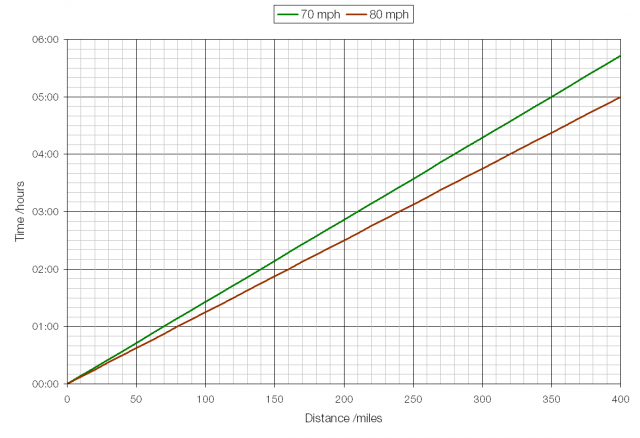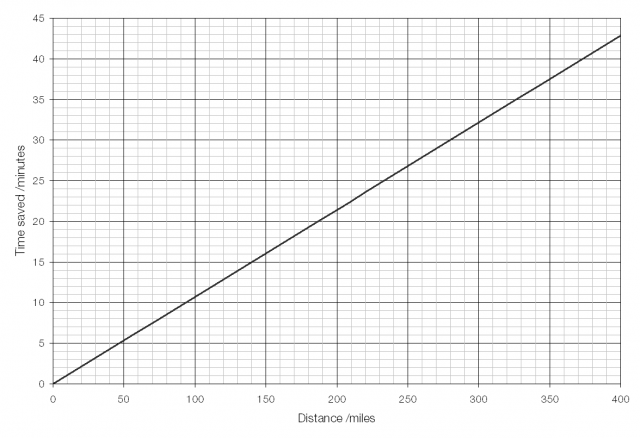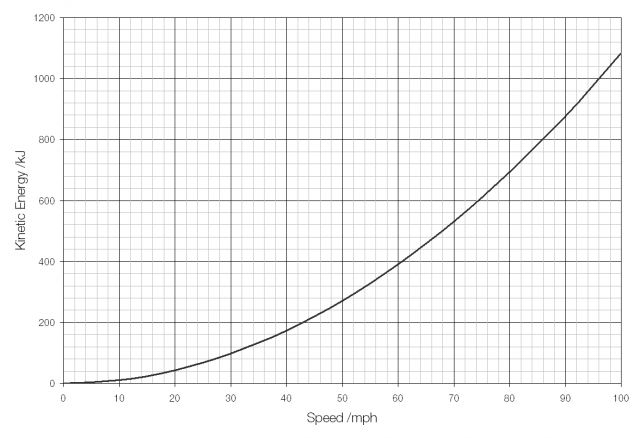The UK government has announced that it is beginning a consultation on raising the speed limit on UK motorways from 70 mph to 80 mph. I don’t think this is a very good idea, and my reasons are listed below.
Time Saving
You simply don’t save that much time by increasing your speed to 80 mph. If you drove the 400 mile distance from London to Edinburgh, you would only save three-quarters of an hour, and that assumes that you maintain a constant speed of 80 mph the entire time, neither accelerating or decellerating.
Assuming no acceleration or deceleration is entirely unrealistic and as it takes longer to accelerate to 80 mph than it does to get to 70 mph, the graphs above represent a best case scenario. The real time savings are likely to be much lower.
Kinetic Energy and Stopping Distance
Kinetic energy at different speeds for my car, a Peugeot 207 with a mass just over 1000 kg.
The kinetic energy of a vehicle is what makes it dangerous; transferring that kinetic energy to an object – be it a pedestrian or another car – is what causes damage. Kinetic energy depends on the square of the speed; if you double the speed of an object you quadruple its kinetic energy. An increase in speed from 70 mph to 80 mph is a 14% increase in speed but this results in a 31% increase in kinetic energy, making the car – in a sense – 31% more dangerous to other road users.
Increasing kinetic energy also increases stopping distance. Increasing the speed limit to 80 mph would increase the average stopping distance on motorways to 120 metres (30 car lengths!), a 25% increase on the 96 metre stopping distance found at 70 mph.
Fuel Economy
The relationship between speed and fuel economy is not linear; fuel economy is poor at both low and high speeds and peaks somewhere between 40 and 60 mph. Driving at 80 mph will decrease fuel economy and therefore increase fuel consumption; fuel costs will be higher and CO2 (and other harmful gas) output will be higher. Our limited supply of petrol will be depleted faster if we all drive at 80 mph than if we drive at 70 mph.



Sometime around march, the speed limit in Spain was lowered to 110km/h (if I remember correctly), only to save money on gas (it’s known to all the crisis that country is living lately, and they need every penny they can save).
Such a move would be a big hit to UK’s accounts, I’d say.
“making the car?—?in a sense?—?31% more dangerous to other road users.”
If you changed that to say “31% more damaging to other users”, I’d agree. Dangerousness requires so many variable factors.
Meanwhile, it needs to be noticed that, should inattention cause a vehicle at 80 mph to hit a vehicle at 70 mph, the impact is equivalent in energy to a 37mph crumple-zone collision, not a 10 mph bump. No guarantee of funtional steering geometry for either vehicle when they then attempt to brake.
Anti-tailgating technology (digicam + number plate recognition) and enforceable laws before 80mph limits, please.
For most modern vehicles, fuel economy peaks much lower than 40-60mph. The wikipedia entry you link to refers to USA vehicles from 1997 (hardly known for their fuel efficient designs)! The graph underneath showing modern European vehicles clearly shows that fuel economy is dropping steeply from 50mph upwards: http://en.wikipedia.org/wiki/File:Highspeedfuelconsumption.png
A recent article testing steady state fuel economy for five modern vehicles vehicles of varying sizes found “the most efficient speed was below 40 mph for all five and as low as 20 mph for two”: http://www.telegraph.co.uk/news/2109539/Fuel-prices-Slower-driving-can-save-motorists-500-a-year.html
You should also bear in mind that in the real world people do not drive at absolutely constant speeds on motorways and in my experience the faster you try to drive, the more often you find yourself having to brake and then accelerate again – burning even more fuel.
The uk uses kilometers per hour not miles per hour smells like fish, but yes more dangerous and more fuel consumption
The UK does not use km/h; we use mph.